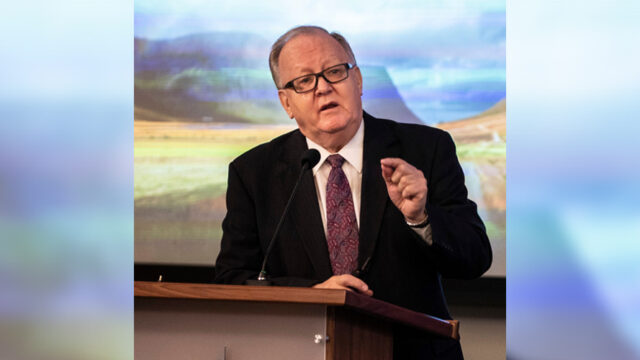A grim fairy tale or guiding light?

The message on the car’s bumper sticker was unmistakable. Shown in big, bold letters, it proclaimed for all to see—“THE BIBLE: A Grim Fairy Tale.” The assertion was a clever play on words, alluding to the well-known children’s fairy tales written by the Brothers Grimm.
The claim itself is nothing new, as atheists, evolutionists, secularists, and others have asserted for nearly two centuries that the Bible is simply an old book filled with made-up tales. Christians, on the other hand, have for centuries defended—sometimes at the cost of their very lives—these sacred writings as God’s Holy Word, and as such are to be taken seriously as an accurate historical account of God’s dealings with humankind; as prophetic, revealing God’s plans for the future; and as divine instruction guiding how one should live today.
Sadly, however, for some time now the nature and purpose of the Bible has become a subject of heated debate even within Christianity, and at the heart of this debate is the authority of the Bible itself.
CRISIS OF AUTHORITY
In his outstanding book Understanding the Living Word of God, the late Gerhard Hasel cited an example of the Bible being interpreted in different ways and wrote, “The crisis of the authority of the Bible is thus very much a matter of how it is interpreted; the crisis is deeply influenced by hermeneutics (the principles of biblical interpretation).”¹
Further, Hasel writes, “The consistent historical position of representative Seventh-day Adventists has been that the Bible is our only infallible rule of faith, doctrine, reforms, and practice.”²
This reflects well our first fundamental belief as Seventh-day Adventists:
1. Holy Scriptures
“The Holy Scriptures, Old and New Testaments, are the written Word of God, given by divine inspiration. The inspired authors spoke and wrote as they were moved by the Holy Spirit. In this Word, God has committed to humanity the knowledge necessary for salvation. The Holy Scriptures are the supreme, authoritative, and the infallible revelation of His will. They are the standard of character, the test of experience, the definitive revealer of doctrines, and the trustworthy record of God’s acts in history. (Ps. 119:105; Prov. 30:5, 6; Isa. 8:20; John 17:17; 1 Thess. 2:13; 2 Tim. 3:16, 17; Heb. 4:12; 2 Peter 1:20, 21.)”³
This balanced, biblical belief in Scripture recognizes that while God did not dictate the Bible word by word (sometimes known as “verbal inspiration”), the Holy Spirit played a vital role in inspiring the biblical authors, who, although coming from different backgrounds and time periods spanning approximately 1,500 years, speak with amazing consistency throughout this collection of ancient documents known as the biblical canon.⁴
UNDERSTANDING SCRIPTURE
In understanding Scripture, as Seventh-day Adventists we subscribe to the historical-grammatical, or historical-biblical, approach to hermeneutics. This means the text should be understood based upon what the author and his audience would have understood it to mean, taking into account the grammar, history, and literary contexts of the passage. It also means that symbolic or metaphorical language needs to be recognized and interpreted in accordance with definitions found in Scripture. This contrasts with historical-critical and literary methods, which exclude the supernatural element of Scripture and place the reader in charge of deciding what the text means and how it should be understood, rather than allowing the Bible to interpret itself.
While we are not able in such a brief article to go into depth on this very important topic, the Seventh-day Adventist Church’s Biblical Research Institute has recently released a helpful book titled Biblical Hermeneutics: An Adventist Approach, edited by Frank M. Hasel, that is available on the BRI website.⁵
GOD’S VOICE IN SCRIPTURE
How one views Scripture is very important because it determines how one will respond to it. Is it simply a piece of literature—a story to be read without chapter or verse, much like a fairy tale in which one might find some good moral lessons? Or perhaps it is something to be dissected, comparing it with scientific “evidence” to determine what (if anything) is true, and the rest to be discarded?
Ellen White is very clear in addressing this issue. In The Acts of the Apostles she writes: “The warnings of the Word of God regarding the perils surrounding the Christian church belong to us today. As in the days of the apostles men tried by tradition and philosophy to destroy faith in the Scriptures, so today, by the pleasing sentiments of higher criticism, evolution, spiritualism, theosophy, and pantheism, the enemy of righteousness is seeking to lead souls into forbidden paths.
“To many the Bible is as a lamp without oil, because they have turned their minds into channels of speculative belief that bring misunderstanding and confusion. The work of higher criticism, in dissecting , conjecturing , reconstructing, is destroying faith in the Bible as a divine revelation. It is robbing God’s Word of power to control, uplift, and inspire human lives. . . .
“The follower of Christ will meet with the ‘enticing words’ against which the apostle warned the Colossian believers. He will meet with spiritualistic interpretations of the Scriptures, but he is not to accept them. His voice is to be heard in clear affirmation of the eternal truths of the Scriptures. Keeping his eyes fixed on Christ, he is to move steadily forward in the path marked out, discarding all ideas that are not in harmony with His teaching. The truth of God is to be the subject for his contemplation and meditation. He is to regard the Bible as the voice of God speaking directly to him. Thus he will find the wisdom which is divine.”⁶
TRANSCENDING TIME AND CULTURE
The Bible is God’s way of communicating with us, transcending time and culture, working through the Holy Spirit, who inspired these writings and protected them over millennia so we could hear Him speaking in an active, living way to us today.
In 2 Timothy 3:16, 17, we are given a clear definition of what the Bible is: “All Scripture is given by inspiration of God, and is profitable for doctrine, for reproof, for correction, for instruction in righteousness, that the man of God may be complete, thoroughly equipped for every good work.”
The Bible is far more than just a good “story.” And it is much more than just a “proof-text manual.” It is the lamp that gives light to our path (Ps. 119:105), and is “sharper than any two-edged sword, piercing even to the division of soul and spirit, and of joints and marrow, and is a discerner of the thoughts and intents of the heart” (Heb. 4:12).
This divinely inspired, living Word is sent by the Creator of the universe to speak to, connect with, teach, admonish, inspire, inform, direct, comfort, and encourage all who will take the time to listen and commune with Him.
¹ Gerhard F. Hasel, Understanding the Living Word of God (Mountain View, Calif.: Pacific Press Pub. Assn., 1980), p. 17.
² Ibid., p. 73.
³ “Official Beliefs of the Seventh-day Adventist Church,” https://www.adventist.org/beliefs/.
⁴ See Hasel, pp. 13, 14.
⁵ Available at https://adventistbiblicalresearch.org/product/biblical-hermeneutics/.
⁶ Ellen G. White, The Acts of the Apostles (Mountain View, Calif.: Pacific Press Pub. Assn., 1911), p. 474.








